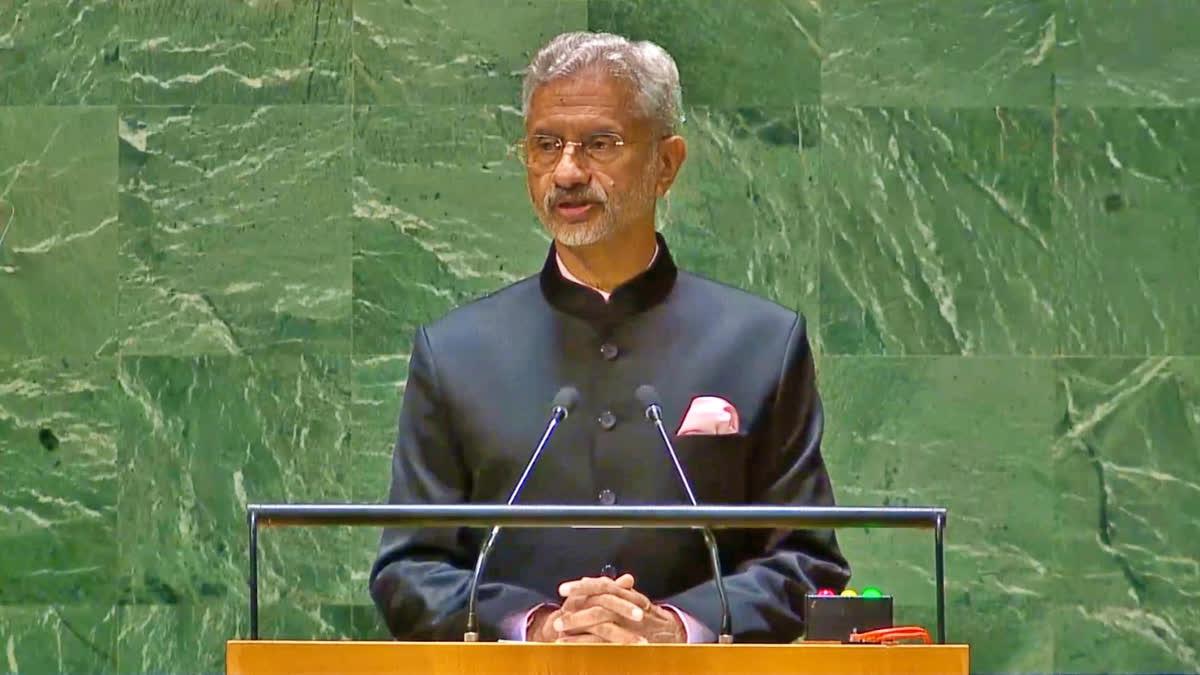United Nations: Days when few nations set the world agenda are over, Foreign Minister S Jaishankar said in his address at the UN General Assembly on Tuesday.
"The days when a few nations set the agenda and expected others to fall in line are over," he said laying stress on how few nations "shape the agenda and seek to define the norms."
"At a time when East-West polarization is so sharp and North-South divide so deep, the New Delhi Summit also affirms that diplomacy and dialogue are the only effective solutions. The international order is diverse and we must cater for divergences, if not differences. The days when a few nations set the agenda and expected others to fall in line are over.
As the United Nations itself symbolizes, finding common ground is an imperative. To listen to others and to respect their viewpoints, this is not weakness; it is the basics of cooperation. Only then can collective efforts on global issues be successful." Jaishankar's statement assumes significance as India pushes for a permanent seat in the Security Council.
"Excellencies, in our deliberations, we often advocate the promotion of a rules-based order. From time to time, respect for the UN Charter is also invoked. But for all the talk, it is still a few nations who shape the agenda and seek to define the norms. This cannot go on indefinitely. Nor will it go unchallenged," he said.
Citing the example of India's initiative at the recently concluded G20 Summit to admit the African Union as a permanent member, Jaishankar exhorted the United Nations to get inspired to also make the Security Council contemporary.
"It was noteworthy that at India's initiative, the African Union was admitted as a permanent member of the G20. By doing so, we gave voice to an entire continent that has long been denied its due," he said.
"This significant step in reform should inspire the United Nations, a much older organization, to also make the Security Council contemporary. Broad representation is after all, a pre-requisite for both effectiveness and credibility," the EAM said.
Here are the key excerpts from Jaishankar's address:
- India's vision of One Earth, One Family, One Future' sought to focus on the key concerns of many, not just the narrow interests of a few.
- India has entered the 'Amrit Kaal'...The world saw a glimpse of what is to come when our Chandrayaan-3 landed on the Moon. Today, our message to the world is in digitally enabled governance and delivery in the widening ambit of amenities and services and rapidly growing infra and in our energetic start-up structure.
- The world is witnessing an exceptional period of turmoil.
- Recently, we hosted the creation of the India-Middle East-Europe Economic Corridor (IMEC). The forging of the Global Biofuels Alliance was another notable development. This willingness to work in an open-minded manner on specific domains is now a defining characteristic of the emerging multipolar order.
- African Union's inclusion in G20 should inspire the United Nations to also make the Security Council contemporary.
- From an era of non-alignment, we have now evolved to that of Vishwa Mitra (a friend to the world).
- This is an occasion to take stock of our achievements and our challenges even while sharing our aspirations and goals. Indeed, in regards to both, there is much that India has to share.
- We have built development partnerships with 78 nations across geographies. We have also been First Responder in disaster emergency situations. The people of Turkiye saw that in February, as did those in Syria.
- Our commitment is understandably even greater, closer home. When Sri Lanka experienced a severe economic crisis, it was India that first stepped forward. But even in distant regions, partners such as the Pacific Islands have appreciated our contributions to meet their needs in health, in technology and in climate action.
- When we aspire to be leading power, it's not for self-aggrandisement but to take on greater responsibility, make contributions.
- It is still a few nations that shape agenda and seek to define norms. This cannot go on indefinitely.
- The New Delhi G20 outcomes are expressed both as larger policies and as specific initiatives. They could be about building cities for tomorrow, or fighting corruption, eliminating hunger, or delivering quality education.
Also read: Jaishankar's UNGA address began with 'Bharat', concluded with 'India'



